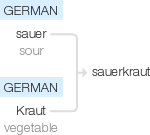Sauerkraut
from German, from sauer ‘sour’ + Kraut ‘vegetable’.
wiktionary
Borrowed into English around 1600 from German Sauerkraut, from sauer(“sour, acidic, spoiled”) + Kraut(“herb; cabbage”). [1]
etymonline
sauerkraut (n.)
"a favorite German dish consisting of cabbage cut fine, pressed, salted, and fermented until sour," 1630s, from German Sauerkraut, literally "sour cabbage," from sauer "sour" (from Proto-Germanic *sura-; see sour (adj.)) + Kraut "vegetable, cabbage," from Old High German krut, from Proto-Germanic *kruthan.
They pickle it [cabbage] up in all high Germany, with salt and barberies, and so keepe it all the yeere, being commonly the first dish you have served in at table, which they call their sawerkrant. [James Hart, "Klinike, or the diet of the diseased," 1633]
In U.S. slang, figurative use for "a German" dates from 1858 (compare kraut). "The effort to substitute liberty-cabbage for sauerkraut, made by professional patriots in 1918, was a complete failure." [Mencken]. French choucroute (19c.) is the German word, but via Alsatian German surkrut but with folk etymology alteration in French based on chou "cabbage" + croûte "crust" (n.).
